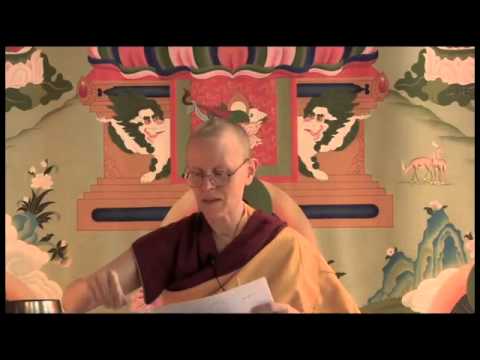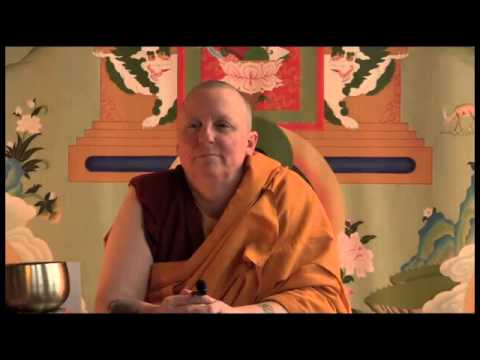Mindfulness of ethical conduct
Mindfulness of ethical conduct
Part of a commentary on Essential Spiritual Advice, a text by the First Dalai Lama outlining the stages of the path to awakening.
- How ethical conduct affects not only our spiritual practice, but others’ faith as well
- The importance of slowing down and reflecting on how our actions will affect ourselves and others
We’ve been talking about this one text. We’re on verse 3. The first three lines are talking about our activities of body, speech, and mind.
Keeping the body humble and at peace,
Speaking neither unpleasantly nor deceptively,
And keeping the mind absorbed
in the spiritually beneficial.
That’s what to do with our body, speech, and mind. In the last few days, I’ve been going back and forth, not just talking about them in sequence but kind of mixing them up, so I intend to follow through with that today.
Today it’s mostly about keeping the mind on what’s spiritually beneficial, which means keeping good ethical conduct, because ethical conduct is the root of all success on our spiritual practice, and it’s also the root of having a happy life this life. A very gross example is like the guys that I write to who are incarcerated, there was a lack of ethical conduct at some point and so they wound up incarcerated. Not everybody who breaks ethical conduct gets incarcerated, but we all experience bad results one way or another in that it really damages our relationships, and it damages our own self-respect
When I look, what brings about this lack of ethical conduct, it’s kind of a thought comes into our mind and then, without pausing to discriminate: “What are the effects of acting on this thought? What are the effects of my actions?” Without stopping to discern it, the thought came to the mind and it gets acted out immediately through our body and speech.
That lack of actually pausing and saying, “What are the effects of my actions?” That lack there is what puts us completely under the influence of our mental afflictions. And it is what makes us really so confused and ignorant, because we don’t know what’s virtuous and what’s nonvirtuous. And we’re not thinking about the results of our actions, and so then when things happen and we don’t like the results, instead of realizing that the results came from how we acted, we blame other people. Then we just get more and more tangled up in our lives, and in more and more conflict with other people.
I think it’s very helpful when the thought comes in the mind, then to stop and think, “Okay, if I act on this thought what are the effects for myself?” Start with ourselves. And then we stop and think, “Okay, is this thought going to bring about the happiness that I’m wanting? Or is it going to destroy that happiness that I’m wanting?” First of all to see the actual results in terms of our getting the happiness that we’re seeking or not. And then also asking, in terms of ourselves, “If I act out this thought, how am I going to feel about myself afterward?”
Sometimes there’s a thought that comes in the mind of: “Well, let’s just do this, nobody will know. But I’ll get some kind of happiness….” And it’s not a really ethical action, but our mind is justifying it by “Nobody will know, it won’t influence anybody else, so therefore it’s okay to do. It’s my life, it’s my business, I’m going to make my own choice.” But the thing is, how do we feel about ourselves after we do that action? Nobody may know, but we’re the ones who have to live with ourselves. So what happens to our sense of integrity if we act in a certain way. What happens to our self-respect if we act in a certain way that contradicts our own values and principles, that contradicts our precepts and what we have promised to do or not do? So, checking out, pausing, saying, “What’s the effect on myself?” In terms of getting happiness, in terms of how I feel about myself. Those two things.
And then, what’s the effect on other people? I do this action, is it going to be something that inspires other people? Or is it going to be something that makes them confused? Especially if we’re a spiritual practitioner, if I do a certain action what are people going to think of somebody who’s a supposed “spiritual practitioner” acting in that way? Some actions they’ll find very inspiring. “Wow, look what this person did, it’s so inspiring.” Other actions, we’re going to destroy people’s faith because they’re going to get really confused, “Wait a minute, I thought this person isn’t supposed to be acting like this, what are they doing acting like this?”
And this is the kind of thing that has happened a lot with the scandals with the Catholic clergy, and the confusion that it’s caused in the minds of the lay people saying, “But wait a minute, didn’t these people have certain precepts? Wait a minute, aren’t they thinking about love and compassion? Wait a minute, aren’t they trying to keep ethical conduct? Even we’re not Catholic clergy, it doesn’t matter, this whole thing still applies to us, too. Because we can, through our actions, either inspire people or destroy their faith. That’s one way of influencing them that’s very heavy. If we destroy their faith spiritually, that’s much more damaging than just hurting their feelings. Sometimes we can say well what’s the effect of my actions on somebody else. Well, their feelings are going to get hurt. Or they’ll be offended. That, actually, is not such a major thing, a damage of doing. We don’t want to do that deliberately, deliberately harm anybody, but the thing that’s really damaging is when we destroy people’s faith. When they have a certain expectation of how we would be acting and then we completely blow that to the wind.
This doesn’t mean that we have to be perfect. We’re clearly not perfect. That’s why we say, when we receive the food offerings that people make, “Although we are not perfect, we will do our best to be worthy of your offering.” People shouldn’t expect us to be perfect. Anyway, I don’t know what perfect means. But, they do know we have certain precepts–or even if you’re not a monastic–just a spiritual practitioner, or you’re a good person, you want to be known as a good-hearted person, then people…. There’s a certain kind of code in society that’s generally accepted about how people should try and act.
Of course, we all make mistakes. But what I’m getting at is to cut down on the number of mistakes, and to cut down on the damage we do. To really pause and think, when thoughts come in our mind: What’s the effect on myself, including how I’m going to feel about myself after I do it? And what’s the effect on others, including how is it going to affect others’ spiritually?
If we can slow things down and try and do that, then we’re going to be much more peaceful inside. Other people are going to be more peaceful. Our relationships are going to be better. And in terms of creating the cause for happiness in the future, we’ll be well on our way to doing that. I think this is what most of us want to do. We just need some support and encouragement, not to mention mindfulness and introspective awareness, so that we can gradually start to do this more and more.
Venerable Thubten Chodron
Venerable Chodron emphasizes the practical application of Buddha’s teachings in our daily lives and is especially skilled at explaining them in ways easily understood and practiced by Westerners. She is well known for her warm, humorous, and lucid teachings. She was ordained as a Buddhist nun in 1977 by Kyabje Ling Rinpoche in Dharamsala, India, and in 1986 she received bhikshuni (full) ordination in Taiwan. Read her full bio.


